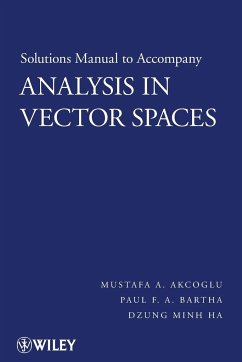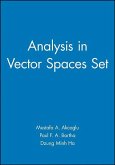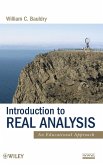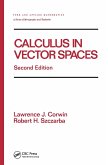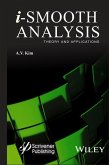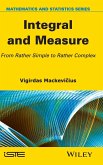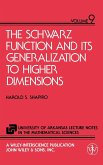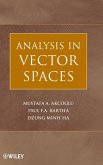A rigorous introduction to calculus in vector spaces The concepts and theorems of advanced calculus combined with related computational methods are essential to understanding nearly all areas of quantitative science. Analysis in Vector Spaces presents the central results of this classic subject through rigorous arguments, discussions, and examples. The book aims to cultivate not only knowledge of the major theoretical results, but also the geometric intuition needed for both mathematical problem-solving and modeling in the formal sciences. The authors begin with an outline of key concepts, terminology, and notation and also provide a basic introduction to set theory, the properties of real numbers, and a review of linear algebra. An elegant approach to eigenvector problems and the spectral theorem sets the stage for later results on volume and integration. Subsequent chapters present the major results of differential and integral calculus of several variables as well as the theory of manifolds. Additional topical coverage includes: * Sets and functions * Real numbers * Vector functions * Normed vector spaces * First- and higher-order derivatives * Diffeomorphisms and manifolds * Multiple integrals * Integration on manifolds * Stokes' theorem * Basic point set topology Numerous examples and exercises are provided in each chapter to reinforce new concepts and to illustrate how results can be applied to additional problems. Furthermore, proofs and examples are presented in a clear style that emphasizes the underlying intuitive ideas. Counterexamples are provided throughout the book to warn against possible mistakes, and extensive appendices outline the construction of real numbers, include a fundamental result about dimension, and present general results about determinants. Assuming only a fundamental understanding of linear algebra and single variable calculus, Analysis in Vector Spaces is an excellent book for a second course in analysis for mathematics, physics, computer science, and engineering majors at the undergraduate and graduate levels. It also serves as a valuable reference for further study in any discipline that requires a firm understanding of mathematical techniques and concepts.
"The authors do not shy away from doing the hard work involved in proving say, the change of variable theorem for integration, the inverse function theorem, and Stokes's theorem--work which is not generally seen in standard calculus books--and thus they are quite correct when they state that students need a firm grip on single-variable calculus and some linear algebra, and a good comfort level with the comprehension and construction of rigorous proofs. Includes many examples and an excellent selection of exercises." (CHOICE, November 2010)

